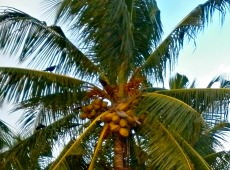Police were summoned to investigate an alleged black magic doll after it was discovered at the Shaviyani Atoll School polling station during the presidential election vote counting.
The suspicious ‘fanditha’ (black magic) doll was first noticed on the school’s wall by an Maldivian Democratic Party (MDP) election observer as well as polling station officials on Kanditheemu Island during the vote counting process Saturday (September 7). They contacted local police to investigate the suspicious doll.
“The police just checked whether the doll was real [fanditha],” MDP Kanditheemu Campaign Manager Mohamed ‘Mox’ Fahumee told Minivan News today (September 9). “They did not actually want to get involved in such [black magic related] things.”
After the police were called to the polling station they – and local islanders – asked community members, the Shaviyani Atoll School’s site supervisor, and Bangladeshi labourers working at the school to try and discover who made the doll and with what intention, explained Fahumee.
“One of the laborers told us he made it ‘just for fun’ to pass the time, since they do not have very much work to do,” said Fahumee. “He made the doll from wool, putty, and wall paint and then placed it on the wall to dry.”
The Maldives Police Service had not responded to enquiries at time of press.
Fanditha fear
“On this island [Kanditheemu] people always talk about black magic during elections. They claim that government aligned parties – the Political Party of the Maldives (PPM), Dhivehi Rayyithunge Party (DRP), etc – practice fanditha to gain votes,” said Fahumee.
“When people talk about fanditha they become afraid,” noted Fahumee.
“Black magic might work, there are so many stories of people dying because of fanditha. During elections people talk about that and it spreads [around the island] very quickly, but they talk in secret,” he continued.
Swing voters who are not strongly in favor one candidate or political party versus another are particularly susceptible to fearing black magic will influence their vote, he explained.
“If they are finding it difficult to select a candidate and they are afraid [of black magic influence], they might vote for someone who does not represent their best interests,” he added.
Fahumee explained that while most island residents talk about possible incidents of fanditha, the discussions are conducted in secret, out of fear the island’s black magic practitioner will “come after” the person(s) talking about him.
Although not everyone believes in the power of fanditha, or “accepts those kinds of things”, it is still an issue – and precautions are taken – because it sows fear and uncertainty about the impartiality of the voting process, noted Fahumee.
More cursed coconuts
Concerns of black magic being used for election vote tampering have been raised on several islands in the Maldives.
MDP supporters on Guraidhoo Island in Kaafu Atoll reportedly began lining up to vote at 2:00pm Friday (September 6), after rumours began circulating of a black magic coconut buried at the front of the queue.
 It is thought the candidate chosen by the first person in line standing over the coconut would then be the candidate picked by all remaining voters.
It is thought the candidate chosen by the first person in line standing over the coconut would then be the candidate picked by all remaining voters.
“We don’t believe in these things, but some MDP supporters waited just in case,” 25 year-old Guraidhoo resident Hussain Nadheef told Minivan News. “We will never let PPM [use black magic].”
Last week, police summoned a white magic practitioner to evaluate a young coconut believed to have been cursed by a black magic spell, after it was found near the Guraidhoo Island presidential election polling station.
Coconuts with black magic spells were allegedly being used to sway voters’ political party allegiance and incite confrontations between MDP supporters and police on Fuvahmulah, ahead of Saturday’s Presidential Election.
Given the widespread reporting of black magic election tampering and the cursed coconut issues on Guraidhoo and Fuvahmulah, Minivan News asked Elections Commission Vice Chair Ahmed Fayaz whether the issue was raised by any election observers.
Fayaz noted that he had not discussed the issue with any of the observers, and had first read about the story on the UK’s Guardian website.
Asked if he felt that the additional international media spotlight on the election triggered by the coconut may have had a positive impact on the election process, Fayaz laughed and said “maybe”.
 “She thought MDP had cast the black magic spells because the coconuts were yellow,’’ the island council source explained. “Once Moosa found out what his wife had done, he told her it was very bad that she had reported it to police.’’
“She thought MDP had cast the black magic spells because the coconuts were yellow,’’ the island council source explained. “Once Moosa found out what his wife had done, he told her it was very bad that she had reported it to police.’’